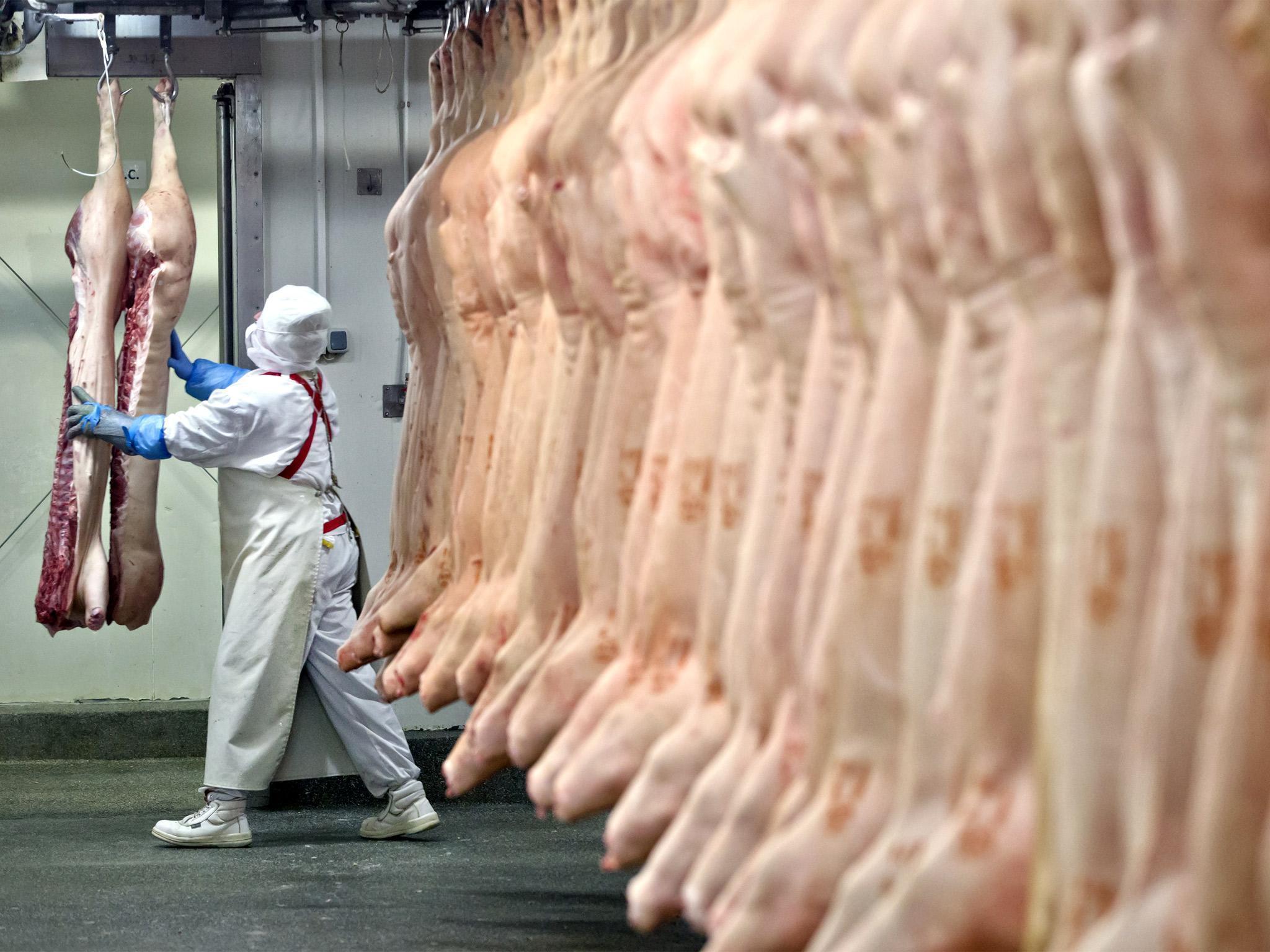Never mind CCTV in slaughterhouses – we need to end the meat and dairy industry altogether
It isn’t just horrific for the animals, producing meat also has a huge effect on the environment and health consequences to humans – even those of us who are vegan


Your support helps us to tell the story
From reproductive rights to climate change to Big Tech, The Independent is on the ground when the story is developing. Whether it's investigating the financials of Elon Musk's pro-Trump PAC or producing our latest documentary, 'The A Word', which shines a light on the American women fighting for reproductive rights, we know how important it is to parse out the facts from the messaging.
At such a critical moment in US history, we need reporters on the ground. Your donation allows us to keep sending journalists to speak to both sides of the story.
The Independent is trusted by Americans across the entire political spectrum. And unlike many other quality news outlets, we choose not to lock Americans out of our reporting and analysis with paywalls. We believe quality journalism should be available to everyone, paid for by those who can afford it.
Your support makes all the difference.It was announced this week that all slaughterhouses in England will have to install CCTV cameras, in a Government move to try to improve animal welfare on UK farms. As a lover of animals, you’d think I would be thrilled at this news. Instead I can’t help but continue to wonder why on earth we are killing animals in the first place. It shouldn’t be a question of whether or not it’s caught on camera.
I went vegan two and a half years ago, much to the shock of my Turkish family who brought me up on kofte (like meatballs), et borek (pastry with meat inside) and homemade kebab. My grandparents grew up in a small village in Cyprus and could rarely afford the luxury of meat. They left the war-torn country for the UK in the 1950s, worked for years in low paid jobs and began to eat meat dishes. Meat was a luxury – why would I choose to give up a luxury?
Let’s start with the obvious argument – animal welfare. These new measures to put cameras in slaughterhouses might mean something if the very process of raising animals to kill them wasn’t cruel in and of itself. The Government claims that these cameras will help uphold animal welfare laws. But under these apparently protective laws farm animals are allowed to be overfed until their legs break from carrying their own weight, are kept crammed in sheds barely seeing a shred of natural daylight in their lives, and live knee deep in their own faeces and the remains of animals who have died around them. This all happens before they get to the slaughterhouse, and it’s all completely legal.
Then there are the slaughterhouses themselves – animals are lined up and killed one by one, often along a moving conveyor belt. Pigs – animals that can solve puzzles, show emotional responses and are thought to be smarter than dogs and almost as smart as chimps – are often heard screaming as, strung up by their legs, they watch other pigs they have been with since birth get tasered and killed, their bodies sliced in half down the middle, mere centimetres away, before they meet the same death.
Dairy farms are no better: there are some where baby cows are separated from their mothers within 24 hours of being born so humans can consume the milk meant for the calves, and egg farms where male chicks are killed at a day old in gas chambers or thrown into a grinder still conscious. This happens on factory and organic farms. Cameras in slaughterhouses won’t have any effect on this. If we as humans can exist without taking another life, why would we choose to do so?
But there are more reasons we should stop consuming animal products that aren’t given nearly as much attention as they should be, such as global warming. According to the UN Food and Agriculture organisation, greenhouse gases from producing livestock make up 14.5 per cent of total global greenhouse gas emissions – that’s more than all transport combined, including cars, buses, boats – and even planes. According to Nasa, clearing land to raise livestock is one of the leading causes of deforestation – we’re literally destroying the earth’s lungs and precious ecosystems to raise farmed animals.
Moreover, studies show that the average amount of water needed to produce one pound of beef is 1,799 gallons. This is compared to a pound of soybeans which takes 216 gallons, and a pound of corn which takes 108 gallons. Considering more than 40 per cent of people worldwide are affected by water scarcity, shouldn’t we be trying to produce food in the least water intensive ways possible? Instead we’re using vast amounts of water and land to grow crops, to then feed to animals to then feed to people. Why don’t we just eat the crops?
Water scarcity is not the only human cost of eating animals. Just this week, millions of eggs have been recalled from supermarkets across the globe for fear that they contain the hazardous substance Fipronil. Eating meat puts humans at risk of diseases like swine flu, bird flu and mad cow disease; I’ve yet to see an outbreak of lentil flu.
Animal farming is contributing to the growth of diseases like E Coli and MRSA and helping them develop further resistance to antibiotics. The NHS has warned against antibiotics used in farm animals, saying that they are a threat to human health.
Then there’s also perhaps the most important consideration for those who are complacent about animal welfare – the people whose lives are affected daily by living near or working on an animal farm. The Department of Health has found that those living within 150 metres of intensive pig farms “could be exposed to multi-drug resistant organisms” in the air that they breathe. Piles of animal manure left in pits regularly run into rivers, cause oxygen depletion and kill river life – 30 per cent of the nitrogen that pollutes water in the EU comes from livestock. The European lung foundation found that emissions from livestock farms cause asthma and COPD (chronic obstructive pulmonary disease) patients living nearby to experience more exacerbations. Living near a livestock farm in the UK, though not as dangerous as the US, is still a health risk.
And then there’s the risk to farm workers themselves. The Government’s introduction of cameras into slaughterhouses is in part due to the fact that so much cruelty has been recorded inside of them. Between 2009-2013, charity Animal Aid secretly filmed inside 13 UK slaughterhouses and found evidence of law-breaking animal welfare breaches in 12 of them. Their website shows undercover footage of animals being stamped on, slapped and burned with cigarettes, and workers hacking at the throats of conscious sheep. What leads people to act this way?
A few months into my veganism, I read an article by a man who went vegan for human rights. I began to read about the mental health effects of working in a slaughterhouse.
“You may look a hog in the eye that’s walking around in the blood pit with you and think, ‘God, that really isn’t a bad looking animal.’ You may want to pet it. Pigs down on the kill floor have come up to nuzzle me like a puppy. Two minutes later I had to kill them… I can’t care.” These are the words of a former slaughterhouse employee, in an interview for the book Slaughterhouse: The Shocking Story of Greed, Neglect, and Inhumane Treatment Inside the US Meat Industry by Gail A Eisnitz.
There are increasing cases of slaughterhouse workers being treated for PTSD, as well as workers’ physical health being at high risk. One US study that took data from more than 500 counties between 1994 and 2002 found that when a slaughterhouse was introduced into a community, violent and sexual crime rates increased.
Is this really a surprise though, when workers are forced to kill hundreds of animals a day – to become desensitised to blood and death – that they suffer mental ill-health or sometimes even increasingly violent behaviour after? No human should have to do that job – and of course it falls predominantly on immigrants into communities, who are struggling to find work elsewhere – after all, who would chose to work in a slaughterhouse?
My grandparents might still be recovering from the confusion of me going vegan, but as a young couple fleeing war with nothing but the clothes on their back they could have easily ended up as slaughterhouse workers. It’s time to abolish slaughterhouses – for the animals both farmed and affected by farming, for the planet and for people, particularly those who are most vulnerable.
Join our commenting forum
Join thought-provoking conversations, follow other Independent readers and see their replies
Comments